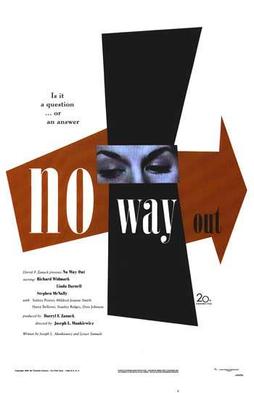No Way Out (1950 film)
No Way Out (1950) is a American film noir directed by Joseph L. Mankiewicz, who also co-wrote the screenplay with Lesser Samuels. The film is notable for its exploration of racism in the United States, making it a pioneering work in American cinema for its time. It stars Richard Widmark, Linda Darnell, and Sidney Poitier in his film debut. The narrative centers around a black doctor, played by Poitier, who is accused of murdering a white patient, played by Widmark, leading to a series of events that escalate racial tensions in the community.
Plot[edit | edit source]
The story begins in a city hospital where Dr. Luther Brooks (Sidney Poitier), a newly licensed black physician, is assigned to treat two white brothers, Ray and Johnny Biddle (Richard Widmark and Dick Paxton), brought in with gunshot wounds from a failed robbery. When Johnny dies under Brooks' care, Ray accuses Brooks of murder, igniting racial tensions. Brooks, seeking to clear his name and understand the true cause of Johnny's death, requests an autopsy. However, the Biddle family's refusal and the community's racial prejudices complicate matters, leading to a climax that confronts the deep-seated racism of the time.
Cast[edit | edit source]
- Sidney Poitier as Dr. Luther Brooks
- Richard Widmark as Ray Biddle
- Linda Darnell as Edie Johnson
- Stephen McNally as Dr. Dan Wharton
- Mildred Joanne Smith as Cora Brooks
- Harry Bellaver as George Biddle
- Stanley Ridges as Dr. Sam Moreland
Production[edit | edit source]
The film was produced by 20th Century Fox and marked a significant moment in Hollywood for addressing the issue of racism directly. Sidney Poitier's casting as Dr. Luther Brooks was groundbreaking, as it presented a black man in a dignified, professional role at a time when African American actors were often relegated to subservient parts. The production faced challenges due to its controversial subject matter, but Mankiewicz's direction and the strong performances of the cast helped to create a compelling and socially relevant narrative.
Reception[edit | edit source]
Upon its release, No Way Out received critical acclaim for its bold examination of racial tensions and its powerful performances, particularly that of Sidney Poitier. The film is considered a classic of the film noir genre and is praised for its progressive stance on race relations. It has since been recognized for its historical significance in American cinema, both for its thematic content and for introducing Sidney Poitier, who would go on to become one of the most respected and influential actors in Hollywood.
Legacy[edit | edit source]
No Way Out is regarded as a landmark film in the history of American cinema for its unflinching portrayal of racism and its role in advancing the careers of its cast, especially Sidney Poitier. The film's exploration of racial issues remains relevant, and it continues to be studied for its cinematic techniques and its impact on the portrayal of race in film. It has also been credited with helping to pave the way for future films that address racial themes more openly and critically.
Search WikiMD
Ad.Tired of being Overweight? Try W8MD's physician weight loss program.
Semaglutide (Ozempic / Wegovy and Tirzepatide (Mounjaro / Zepbound) available.
Advertise on WikiMD
|
WikiMD's Wellness Encyclopedia |
| Let Food Be Thy Medicine Medicine Thy Food - Hippocrates |
Translate this page: - East Asian
中文,
日本,
한국어,
South Asian
हिन्दी,
தமிழ்,
తెలుగు,
Urdu,
ಕನ್ನಡ,
Southeast Asian
Indonesian,
Vietnamese,
Thai,
မြန်မာဘာသာ,
বাংলা
European
español,
Deutsch,
français,
Greek,
português do Brasil,
polski,
română,
русский,
Nederlands,
norsk,
svenska,
suomi,
Italian
Middle Eastern & African
عربى,
Turkish,
Persian,
Hebrew,
Afrikaans,
isiZulu,
Kiswahili,
Other
Bulgarian,
Hungarian,
Czech,
Swedish,
മലയാളം,
मराठी,
ਪੰਜਾਬੀ,
ગુજરાતી,
Portuguese,
Ukrainian
Medical Disclaimer: WikiMD is not a substitute for professional medical advice. The information on WikiMD is provided as an information resource only, may be incorrect, outdated or misleading, and is not to be used or relied on for any diagnostic or treatment purposes. Please consult your health care provider before making any healthcare decisions or for guidance about a specific medical condition. WikiMD expressly disclaims responsibility, and shall have no liability, for any damages, loss, injury, or liability whatsoever suffered as a result of your reliance on the information contained in this site. By visiting this site you agree to the foregoing terms and conditions, which may from time to time be changed or supplemented by WikiMD. If you do not agree to the foregoing terms and conditions, you should not enter or use this site. See full disclaimer.
Credits:Most images are courtesy of Wikimedia commons, and templates Wikipedia, licensed under CC BY SA or similar.
Contributors: Prab R. Tumpati, MD

